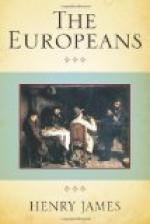“And what message am I to take to them?” asked Felix, who had a lively faith in the justness of his sister’s arrangements.
She looked at him a moment—at his expression of agreeable veracity; and, with that justness that he admired, she replied, “Say what you please. Tell my story in the way that seems to you most—natural.” And she bent her forehead for him to kiss.
CHAPTER II
The next day was splendid, as Felix had prophesied; if the winter had suddenly leaped into spring, the spring had for the moment as quickly leaped into summer. This was an observation made by a young girl who came out of a large square house in the country, and strolled about in the spacious garden which separated it from a muddy road. The flowering shrubs and the neatly-disposed plants were basking in the abundant light and warmth; the transparent shade of the great elms—they were magnificent trees—seemed to thicken by the hour; and the intensely habitual stillness offered a submissive medium to the sound of a distant church-bell. The young girl listened to the church-bell; but she was not dressed for church. She was bare-headed; she wore a white muslin waist, with an embroidered border, and the skirt of her dress was of colored muslin. She was a young lady of some two or three and twenty years of age, and though a young person of her sex walking bare-headed in a garden, of a Sunday morning in spring-time, can, in the nature of things, never be a displeasing object, you would not have pronounced this innocent Sabbath-breaker especially pretty. She was tall and pale, thin and a little awkward; her hair was fair and perfectly straight; her eyes were dark, and they had the singularity of seeming at once dull and restless—differing herein, as you see, fatally from the ideal “fine eyes,” which we always imagine to be both brilliant and tranquil. The doors and windows of the large square house were all wide open, to admit the purifying sunshine, which lay in generous patches upon the floor of a wide, high, covered piazza adjusted to two sides of the mansion—a piazza on which several straw-bottomed rocking-chairs and half a dozen of those small cylindrical stools in green and blue porcelain, which suggest an affiliation between the residents and the Eastern trade, were symmetrically disposed. It was an ancient house—ancient in the sense of being eighty years old; it was built of wood, painted a clean, clear, faded gray, and adorned along the front, at intervals, with flat wooden pilasters, painted white. These pilasters appeared to support a kind of classic pediment, which was decorated in the middle by a large triple window in a boldly carved frame, and in each of its smaller angles by a glazed circular aperture. A large white door, furnished with a highly-polished brass knocker, presented itself to the rural-looking road, with which it was connected by a spacious pathway, paved with worn and cracked,




